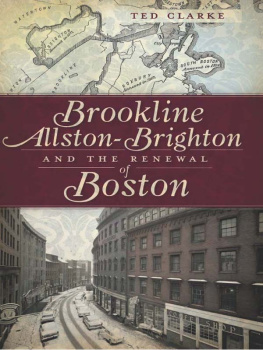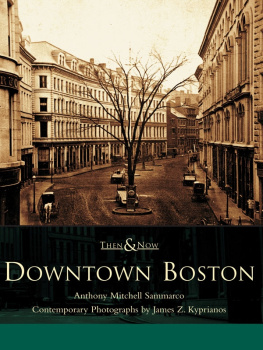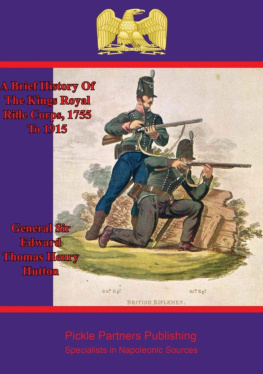I.
Boston has been an important place for more than two hundred and fifty years. Its history is intimately bound up with that of Massachusetts, of which it is the capital, and of New England, of which it has long been the metropolis. It has suffered many vicissitudes and undergone striking transformations in respect to territory and topography, as well as the form of its government, but from the beginning it has been a seed-plot and nursery of advanced political and social ideas and experiments.
The purpose of these pages is twofold: (1) to furnish a clue to the history of Boston as an individual community that, owing to the force of circumstances and the spirit of its people, has played a conspicuous and influential part in the larger development of Massachusetts, of New England and of the nation; and (2) to indicate the nature of the events that gave historical significance to memorable sites and objects that have survived the ravages of time and still excite interest and veneration.
So it is not a history that we present to our readers, but rather a relation or narrative concerning the development of "a poor country village" into a great city of vast and q varied interests and of commanding rank.
It is not our purpose to attempt to recount with fulness of detail all or even most of the deeds of which Bostonians are proud, or to pass judgment upon men or measures involved in controversial questions as to morals or politics that once seemed of vital moment and are still capable of arousing warm discussion. Such matters are better left to technical historians and partisan pamphleteers.
We conceive our relation as somewhat resembling the report which Capt. John Smith published in 1616 on his exploration in 1614 of the coast of what was then generally known as North Virginia. "In this voyage," he says, "I took the description of the coast, as well by map as writing, and called it New England." His original map showed the trends of the coast line from "Pennobscot to Cape Cod." There appear also the principal headlands, bays, river mouths and Indian villages along the shore, together with a few outstanding mountains and not a few outlying islands, but the bulk of the back country is prudently left blank. In later editions of the map considerable portions back from the shore contain additional geographical data, notably in the region at the head of Massachusetts Bay.
"New England," says Smith, "is that part of America in the Ocean Sea opposite to Nova Albyon in the South Sea, discovered by the most memorable Sir Francis Drake in his voyage about the world. In regard thereto this is stiled New England, being in the same latitude.
New France, off it is Northward; Southward is Virginia, and all the adjoining Continent, with New Granado, New Spaine, New Andolosia, and the West Indies."
It is noteworthy that in the course of three hundred years all the names enumerated above by the Admiral of New England, save New England, Virginia and the West Indies, have faded from the map; and also that New England remains the most distinctively individual section of the United States, which include much of Smith's New France and New Spaine, as well as Drake's Nova Albyon (California).
Smith's map is still of interest not only because it was the first, and for years the standard, map of New England, but also because we find on it a spot named "Boston," by King Charles I., who was Prince of Wales when Smith made humble suit that he "would please to change their Barbarous names, for such English, as Posterity may say, Prince Charles was their Godfather." So it was a Stuart Prince who confirmed Smith's choice of New England as against the names Nusconcus, Canaday, Pemaquidia and Norumbega (all of which were then current) and substituted English for Indian names on the original map dedicated to him. Strange to say it was at Accomack, named Plimouth by Prince Charles, that the Pilgrim Fathers laid out their New Plymouth in 1620. The name of the Indian village of Accomenticus (Agamenticus) was changed to Boston in 1616. Later the Lord Proprietor of that part of Maine named it Gorgeana, about 1641 (after himself), and directed that it should be styled and organized as a city corporation.
Old York in Maine is usually held to contain the site of the Boston of 1616, which as Gorgeana in 1641 or thereabouts had the first Mayor in New England.
Smith's map was frequently revised and republished.
Its tenth state, issued in 1635, shows two Bostons, ours on the south bank of the Charles River and the Stuart Boston on a bay east of what is still known as Mount Agamenticus.
Lest we forget what we owe to the Godfather of New England, it may be well to note some sites whose names commemorate his gracious complaisance. He named Cape Ann in honor of his mother and the Charles River in honor of himself. In honor of his father he renamed Cape Cod, Cape James, and in honor of his House he gave the name of Stuard's Bay to what is now known as Cape Cod Bay.
Practically all the Charlestons and Charlestowns in the country were named directly or indirectly for King Charles I. or King Charles II., while the capes of Virginia still bear the names that Smith on his way to Jamestown in 1607 gave them in honor of his sovereign's heirs, Prince Charles and his elder brother, Prince Henry.
In Massachusetts, the County of Duke's County, incorporated 1695, commemorates the transfer of Martha's Vineyard from the Duke of York's Province to the Bay Colony.
Other Stuart memorials are found in the names of Maryland, so called in compliment to Henrietta Maria, Charles the First's Consort, and New York, named for his son James II., to whom as the Duke of York the greater part of New Netherland was given by Charles II., in 1664, after its seizure from the Dutch.
Although the colonizers of Virginia and New England suffered much at the hands of the Stuarts it should be remembered that it was owing to their good nature that the first permanent English settlements were effected.
In Smith's career the changeful spirit of the promoters of colonization of the English possessions in the New World is reflected. Beginning as a hardy adventurer and knight-errant, he became first an explorer, then a practical colonizer and then a writer on the best methods of effecting and conducting English settlements in New England. Again and again his ambition to plant an outpost for trading and fishing on the coast, which he had mapped and to which he had given the name it still bears, was balked. In 1631, the year of his death, the sometime Governor of Virginia and Admiral of New England published his last book, viz., "Advertisements for the inexperienced Planters of New England, or anywhere.". In it he makes mention of the Brownists (Pilgrims) on Plymouth Bay, which bay he had visited in 1614, and of Mr. Winthrop's new settlement at the head of Massachusetts Bay, which he had happily characterized as "the Paradise of these parts," although he had never set foot there.
His was the fate of many another American pioneer who came after him. Shortly before he died he wrote, "But I see those countries shared before me by those who know them only by my description."
Ten years before the publication of Smith's Description of New England, the English crown had adopted the policy of actively promoting the colonization of those parts of North America which it claimed to possess by virtue of the discoveries of the Cabots in 1497 and 1498 under the patronage of Henry VII. How little that astute and avaricious potentate appreciated the value of the continent discovered by the Cabots may be inferred from an entry said to have been made in his private accounts, viz., "To the man that found the new island, 10."









